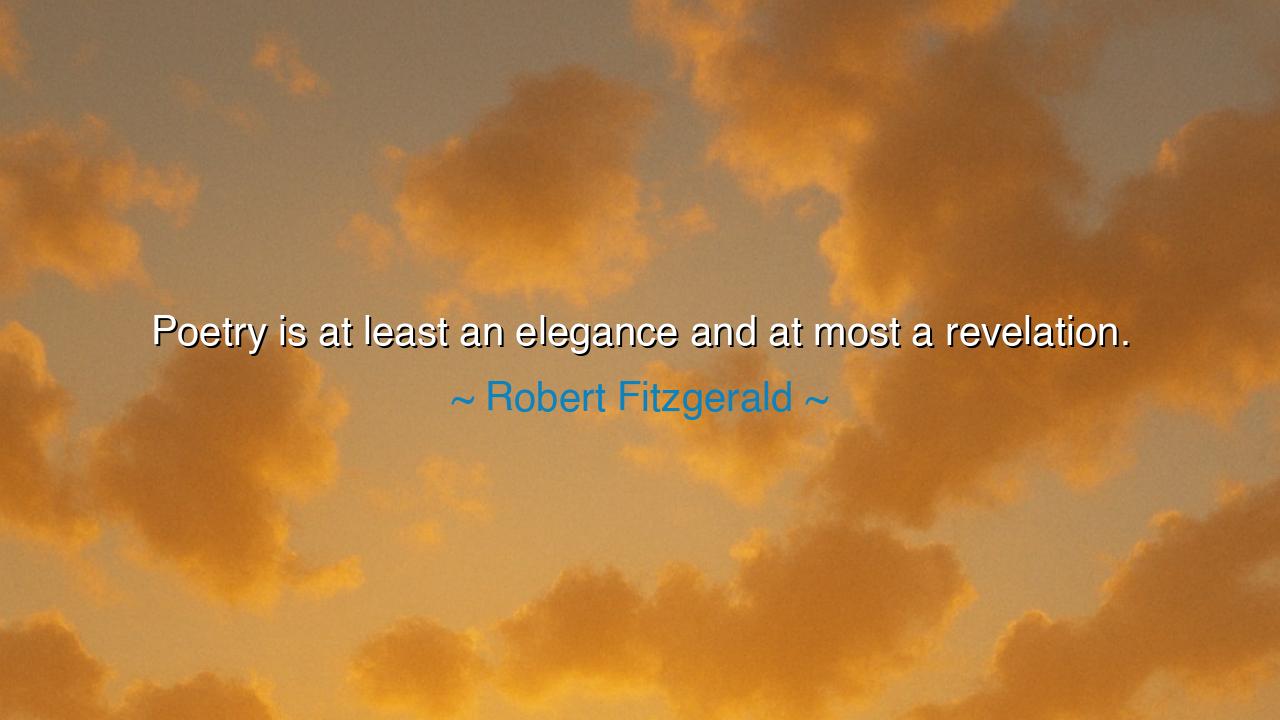
Poetry is at least an elegance and at most a revelation.






“Poetry is at least an elegance and at most a revelation.” Thus spoke Robert Fitzgerald, poet and translator of Homer, who carried the voices of the ancients into the ears of the modern world. His words remind us of the double nature of poetry: on one side, it is refinement, grace, the art of shaping language into beauty; on the other, it is thunder and lightning, tearing open the heavens to show us what we had never seen before.
The meaning of this saying lies in the spectrum of poetry’s power. At its humblest, poetry offers elegance: it teaches us clarity, rhythm, proportion. It is the polish of thought, the music of language arranged with care. This is already no small thing, for elegance lifts us above coarseness, teaching us to value beauty in words and order in thought. Yet poetry does not stop here. At its highest, it becomes revelation: a sudden unveiling of truth that no argument could prove, no prose could carry. The greatest poems change how we see the world forever.
The origin of Fitzgerald’s wisdom rests in his lifelong devotion to the epic poets of Greece and Rome. In translating Homer, he touched both ends of the spectrum. Homer’s verses, shaped with rhythm and symmetry, have the elegance of perfect craft. Yet within them also lies revelation: the truth of mortality, the rage of Achilles, the endurance of Odysseus—all truths about the human condition that continue to speak after three millennia. Fitzgerald, standing at the crossroads of ancient and modern, saw how poetry always moves between elegance and revelation.
Consider the example of William Blake, whose short, delicate poems like The Lamb seem at first like simple elegances of verse, childlike in their clarity. Yet in works like The Marriage of Heaven and Hell, his poetry erupts into revelation, proclaiming visions of eternity, defiance of tyranny, and the burning fire of imagination. The same poet could adorn language with gentle beauty or split the fabric of the world with prophetic thunder. Here, again, we see Fitzgerald’s insight: poetry is both elegance and revelation, and at times, both in one breath.
The lesson is that we must approach poetry with reverence, for even its smallest offering can refine us, and its greatest gift can transform us. To read a sonnet by Shakespeare is to learn the elegance of balance and proportion; to read his darker lines on death and time is to glimpse revelation, the truth of mortality and love that endures it. We should never dismiss poetry as trivial or ornamental, for even when it offers only elegance, it is already shaping us toward the greater mysteries it sometimes reveals.
Practically, this means we should cultivate the habit of reading poetry not only for its surface beauty but for its deeper resonance. When we encounter elegant verse, we should savor its grace; when we stumble upon revelation, we should let it pierce us, unsettle us, change us. Write your own verses, too, even if simple, for in the act of seeking elegance, you prepare yourself for the possibility of revelation.
Thus the teaching endures: poetry, in its least form, polishes our speech and ennobles our minds; in its highest form, it opens to us the hidden truths of existence. Fitzgerald’s words call us to honor both. For elegance makes us more human, but revelation makes us more alive. Let us therefore approach every poem as a doorway—sometimes into beauty, sometimes into truth, and sometimes, if fortune favors, into both at once.






TTNgo Trong Toan
The idea that poetry is both elegance and revelation is really compelling. But it makes me ask: is there a risk in focusing too much on one aspect over the other? Can poetry that is too concerned with elegance lose its power to reveal anything meaningful? Or conversely, can poetry that is too focused on revelation lose its aesthetic appeal? What’s the ideal balance in your opinion?
H1Ngoc Huong 10A9
This quote strikes me because it captures the dual nature of poetry: it can either be a polished, beautiful object or something that shifts our understanding of the world. How do you think poets achieve that balance between elegance and revelation? Can one exist without the other, or does the best poetry always weave both together, creating something both beautiful and enlightening?
UGUser Google
Fitzgerald’s perspective makes me think about how poetry functions differently from other forms of writing. If it’s elegance at the least, then is it possible for a poem to be beautifully crafted but lacking in meaning? On the other hand, if poetry’s highest aim is revelation, does that imply that its true power lies in its ability to uncover hidden truths or emotions?
TTTan Tran
I love the idea that poetry can be both an elegant art form and a powerful revelation. It makes me wonder—how do poets balance beauty with profound insight? Can poetry be truly elegant without conveying something deeper, or is elegance enough in itself? What do you think—does the best poetry always reveal something about the world, or can it simply be appreciated for its form and rhythm alone?